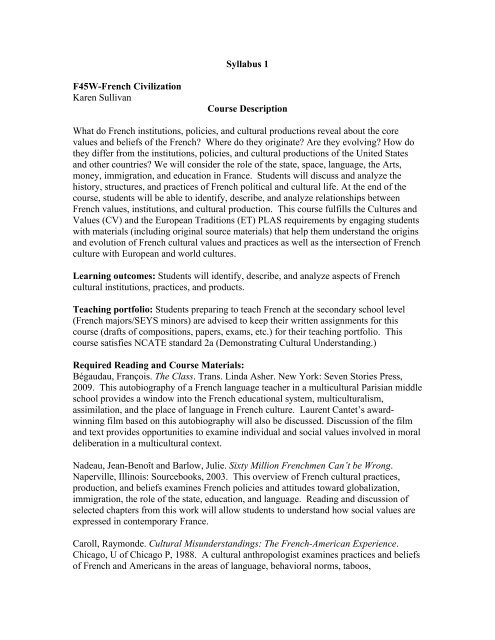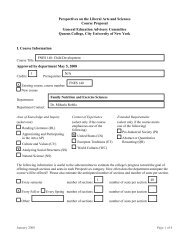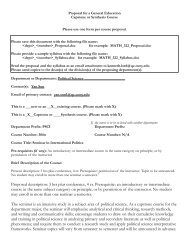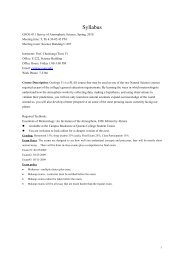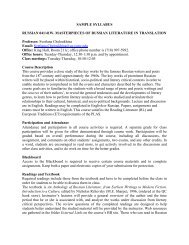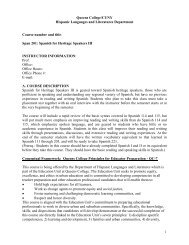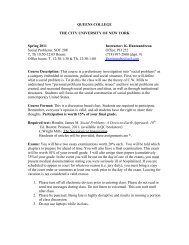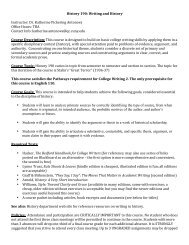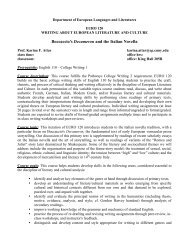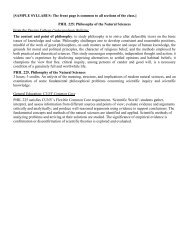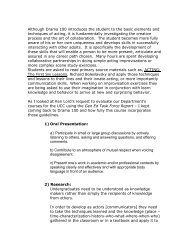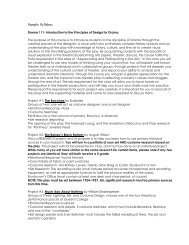Syllabus 1 F45W-French Civilization Karen Sullivan Course ... - CUNY
Syllabus 1 F45W-French Civilization Karen Sullivan Course ... - CUNY
Syllabus 1 F45W-French Civilization Karen Sullivan Course ... - CUNY
Create successful ePaper yourself
Turn your PDF publications into a flip-book with our unique Google optimized e-Paper software.
<strong>F45W</strong>-<strong>French</strong> <strong>Civilization</strong><br />
<strong>Karen</strong> <strong>Sullivan</strong><br />
<strong>Syllabus</strong> 1<br />
<strong>Course</strong> Description<br />
What do <strong>French</strong> institutions, policies, and cultural productions reveal about the core<br />
values and beliefs of the <strong>French</strong>? Where do they originate? Are they evolving? How do<br />
they differ from the institutions, policies, and cultural productions of the United States<br />
and other countries? We will consider the role of the state, space, language, the Arts,<br />
money, immigration, and education in France. Students will discuss and analyze the<br />
history, structures, and practices of <strong>French</strong> political and cultural life. At the end of the<br />
course, students will be able to identify, describe, and analyze relationships between<br />
<strong>French</strong> values, institutions, and cultural production. This course fulfills the Cultures and<br />
Values (CV) and the European Traditions (ET) PLAS requirements by engaging students<br />
with materials (including original source materials) that help them understand the origins<br />
and evolution of <strong>French</strong> cultural values and practices as well as the intersection of <strong>French</strong><br />
culture with European and world cultures.<br />
Learning outcomes: Students will identify, describe, and analyze aspects of <strong>French</strong><br />
cultural institutions, practices, and products.<br />
Teaching portfolio: Students preparing to teach <strong>French</strong> at the secondary school level<br />
(<strong>French</strong> majors/SEYS minors) are advised to keep their written assignments for this<br />
course (drafts of compositions, papers, exams, etc.) for their teaching portfolio. This<br />
course satisfies NCATE standard 2a (Demonstrating Cultural Understanding.)<br />
Required Reading and <strong>Course</strong> Materials:<br />
Bégaudau, François. The Class. Trans. Linda Asher. New York: Seven Stories Press,<br />
2009. This autobiography of a <strong>French</strong> language teacher in a multicultural Parisian middle<br />
school provides a window into the <strong>French</strong> educational system, multiculturalism,<br />
assimilation, and the place of language in <strong>French</strong> culture. Laurent Cantet’s awardwinning<br />
film based on this autobiography will also be discussed. Discussion of the film<br />
and text provides opportunities to examine individual and social values involved in moral<br />
deliberation in a multicultural context.<br />
Nadeau, Jean-Benoît and Barlow, Julie. Sixty Million <strong>French</strong>men Can’t be Wrong.<br />
Naperville, Illinois: Sourcebooks, 2003. This overview of <strong>French</strong> cultural practices,<br />
production, and beliefs examines <strong>French</strong> policies and attitudes toward globalization,<br />
immigration, the role of the state, education, and language. Reading and discussion of<br />
selected chapters from this work will allow students to understand how social values are<br />
expressed in contemporary France.<br />
Caroll, Raymonde. Cultural Misunderstandings: The <strong>French</strong>-American Experience.<br />
Chicago, U of Chicago P, 1988. A cultural anthropologist examines practices and beliefs<br />
of <strong>French</strong> and Americans in the areas of language, behavioral norms, taboos,
interpersonal relationships, space, and family dynamics. This book will introduce<br />
students to methods of cross-cultural analysis.<br />
The Cambridge Companion to Modern <strong>French</strong> Culture. Ed. Nicholas Hewitt. Cambridge:<br />
Cambridge UP, 2003. Chapters examine <strong>French</strong> institutions, developments, and cultural<br />
production in the arts, politics, economics, and journalism. Selected readings allow<br />
students to understand <strong>French</strong> institutions and practices from a number of disciplinary<br />
perspectives.<br />
Students’ Responsibilities and Grading:<br />
Preparation, homework, reading questions 10%<br />
Reaction papers (2) 15%<br />
Mid-term exam 15%<br />
Research Paper<br />
Proposal and outline (due week 6) 5%<br />
Presentation 10%<br />
Paper (6-8 pages) 25%<br />
Final Exam 20%<br />
<strong>Syllabus</strong><br />
Week 1<br />
Introduction to course methods and objectives.<br />
Historical overview and “Old Regime”<br />
Week 2: Space<br />
<strong>French</strong> attitudes toward land and state<br />
Week 3: State Structures<br />
Centralization, Regionalization, and the “Etat Providence,” Reaction Paper 1 due<br />
Week 4: World War II<br />
Historical context, antisemitism, the Resistance, reconstruction and accountability<br />
Week 5: Colonialism and the Algerian War<br />
Historical context, decolonisation, “pieds noirs” and “harkis,” assimilation and civil<br />
rights<br />
Week 6: Money<br />
Globalization and Modernization, taxation, public assistance and family status, Research<br />
Paper proposal and outline due<br />
Week 7: Language<br />
The <strong>French</strong> Academy, language and politics, language and education, Mid-term exam
Week 8: The Arts<br />
Visual arts, cinema, music, dance<br />
Week 9: Education<br />
History, Structure, primary schools, lycées, universities and “Grandes Ecoles”<br />
Week 10: Paris<br />
Topography and history, Paris and the Arts, Paris in <strong>French</strong> History Reaction Paper 2<br />
due<br />
Week 11: <strong>French</strong> Multiculturalism<br />
Religious and ethnic minorities, “les jeunes”<br />
Week 12: France in Europe, France in the World<br />
History and influence of the European Union, La Francophonie<br />
Week 13: Presentations<br />
Week 14: Presentations<br />
Week 15: Finals review. Final papers due
<strong>Syllabus</strong> 2<br />
F45: <strong>French</strong> <strong>Civilization</strong>: CUISINE: THE FRENCH CONNECTION TO FOOD<br />
PROF. GREET VAN BELLE<br />
Dr. Greet Van Belle<br />
Office:<br />
Office hours:<br />
greet.vanbelle@qc.cuny.edu<br />
DESCRIPTION & LEARNING OUTCOMES:<br />
Cuisine: how <strong>French</strong> is it? In this class we will explore the idea and reality of <strong>French</strong><br />
cuisine through a critical reflection on cookbooks, menus, cooking shows, restaurant<br />
guides, culinary history, recipes and movies, and through a dinner at the <strong>French</strong> Culinary<br />
Institute and a talk with a wine connoisseur. The purpose is to develop a cultural and<br />
socio-historical perspective on the <strong>French</strong> connection to food: What or who "made"<br />
<strong>French</strong> cuisine? Has <strong>French</strong> cuisine changed and if so, how? What socio-economic and<br />
cultural conditions made cuisine <strong>French</strong>?<br />
Besides getting acquainted with keywords and notions of <strong>French</strong> history and geography<br />
you will explore your own response to <strong>French</strong> cuisine—your fear or awe, your<br />
connoisseurship or lack thereof, your indifference, your disgust, etc.—and learn to put<br />
this response in perspective—culturally, historically and sociologically.<br />
You will learn to use the vocabulary and discursive logic of cultural analysis; to critically<br />
examine “foreign” perceptions of <strong>French</strong> culture; and to pursue on your own a critical<br />
examination of your own culture’s connection to food.<br />
Critical examination of primary sources and close reading of exemplary texts of cultural<br />
analysis will prepare you to conduct your own original field and academic research and to<br />
deliver a well written cultural analysis about your own cuisine by the end of the semester.<br />
This course fulfills the Cultures and Values (CV) and the European Traditions (ET)<br />
PLAS requirements.<br />
Teaching portfolio: Students preparing to teach <strong>French</strong> at the secondary school level<br />
(<strong>French</strong> majors/SEYS minors) are advised to keep their written assignments for this<br />
course (drafts of compositions, papers, exams, etc.) for their teaching portfolio. This<br />
course satisfies NCATE standard 2a (Demonstrating Cultural Understanding.)
REQUIRED TEXTS:<br />
DINNER:<br />
Rick Steves’ France & Paris City Map<br />
Brillat-Savarin, The Physiology of Taste. Penguin Classics 1994<br />
Child, My Life in France. Anchor Books 2007<br />
Spang, The Invention of the Restaurant. Harvard U Press 2000<br />
Reader: Dr. Greet Van Belle: Cuisine, The <strong>French</strong> Connection to Food<br />
Dinner at L’Ecole The Restaurant of the <strong>French</strong> Culinary Institute. (around $52/person<br />
tax and gratuity included)<br />
GRADING & COURSE POLICIES:<br />
Participation: 10%<br />
Preparation: 10%<br />
Presentation: 10%<br />
3 Quizzes: 15%<br />
Papers: 15%<br />
Research paper: 30%<br />
Final: 10%<br />
Presence & Participation: (140pts total: 5pts/class)<br />
Be Present.<br />
« Attention ! » :<br />
Please email us if you are planning to miss a scheduled class meeting.<br />
You are not considered present when you use a cell phone in any way or<br />
shape or when you leave class repeatedly or for a considerable time.<br />
Be On time.<br />
Be Willing to share your thoughts and responses.<br />
Be Respectful: One speaker at a time. Raise your hand when you have a question or<br />
want to give a comment. Listen to your classmates’ comments.<br />
Be On-task: Give comments that are relevant to the material discussed.<br />
Be Constructive: Be thoughtful and share ideas or thoughts. Do not just vent or<br />
solicit reactions.<br />
Preparation: (140pts total: 5pts/class)<br />
Be Prepared with the readings and the pre-assigned questions.
Presentation:<br />
Each class a different student will read out loud and comment on a pre-assigned<br />
passage from The Physiology of Taste. (15min.)<br />
Your reading out loud should reflect your understanding of the text. (10pts)<br />
Your comments should be relevant to the course, thoughtful and noteworthy.<br />
(10pts)<br />
Quizzes: (to be announced one class beforehand)<br />
Short quizzes that test your knowledge regarding key notions and concepts<br />
learned in class.<br />
Final (Content):<br />
Tests the knowledge regarding key notions and concepts acquired during the<br />
whole semester.<br />
Papers and Research Paper: (subject, dates, format, and grading rubric to be handed<br />
out)<br />
TIMELINE<br />
(C): What is on the menu that day in class<br />
(HW): Homework to be done for NEXT class<br />
TextxB: Text from Book<br />
TextxR: Text from Reader<br />
ReadingP: Reading of and comments on a “meditation” from The Physiology of Taste<br />
ON THE MENU<br />
1. FRI AUG28<br />
(C+Cw) Introductions; Reading the Menu and In-class writing<br />
(HW) Exploring the Map<br />
I. A BITE OF HISTORY<br />
Text1R: Pinkard, Toward a New Culinary Aesthetic—Foundations of Change (1600-<br />
1650)<br />
Film1: Joffé, Vatel<br />
2. TUE SEPT1!<br />
3. FRI SEPT4!<br />
(C) Film and discussion: Vatel<br />
(HW) Text1R: questions pp.51-71
4. TUE SEPT8<br />
(C) Discussion Text1R<br />
(HW) Text1R: pp.71-94<br />
5. FRI SEPT11<br />
(C) Discussion Text1R cont.<br />
ReadingP1 [prof]: pp.13-14: Aphorisms<br />
(HW) Text2B: pp.34-52<br />
II. A CUP OF RESTAURANT<br />
Text2B: Spang, The Nouvelle Cuisine of Rousseauian Sensibility<br />
6. TUE SEPT15<br />
(C) Discussion Text2B: pp.34-52<br />
(HW) Text2B: pp.52-63<br />
7. TUE SEPT22<br />
(C) Discussion Text2B: pp.52-63<br />
(HW) Text3B: pp.119-145<br />
III. WHO IS FOOTING THE BILL?<br />
Text3: Spang, Fixed Prices: Gluttony and the <strong>French</strong> Revolution<br />
8. FRI SEPT25<br />
(C) Discussion Text3B: pp.119-145<br />
ReadingP2 [Sikha]: pp.132-140: On Gourmandism (55, 56, 58, 59, 60)<br />
(HW) Text6R<br />
IV. “AH, HOW YOU WILL DELIGHT THE ANGELS!"<br />
Film2: Axel, Babette’s Feast<br />
Text4R: Ferguson, Babette’s Feast: A Fable for Culinary France<br />
Text5R: Some Quotes from Babette’s Feast<br />
Text6R: Mennel, Puritanism and Food
9. FRI OCT2!<br />
10. TUE OCT6!<br />
11. FRI OCT9<br />
V. PARIS!<br />
(C) Film and Discussion: Babette’s Feast<br />
ReadingP3 [Angela]: pp.81-84: On Game (39)<br />
(HW) Text4R, 5R<br />
(C) Discussion Text4R, 5R, 6R<br />
ReadingP4 [Stephanie]: pp.160-163: On the Pleasures of the Table (71,<br />
72, 73, 74); ReadingP5 [Chenice]: pp.90-96: On Truffles (43), Erotic<br />
Property of Truffles (44)<br />
(HW) Text7B: pp.170-180<br />
Text7B: Spang, Putting Paris on the Menu<br />
12. TUE OCT13<br />
13. FRI OCT16<br />
(C) Discussion Text7B: pp.170-180<br />
ReadingP6 [Madeline]: pp.134-136: The Power of Gourmandism (57)<br />
(HW) Text7B: pp.180-192<br />
(C) Discussion Text7B: pp.180-192<br />
ReadingP7 [Maeda]: pp.267-275: On Restaurateurs (137, 138, 139, 140,<br />
141)<br />
(HW) Text7B: pp.192-206<br />
14. TUE OCT20<br />
(C) Discussion Text7B: pp.192-206<br />
ReadingP8 [Mairim]: pp.267-275: On Restaurateurs cont. (142, 143, 144,<br />
145)<br />
(HW) Text8R + Text9R: pp.211-222
VI. “TRINQUONS,” DIT PANURGE<br />
Text8R: Barthes, Wine and Milk<br />
Text9R: Pinkard, The Revolution in Wine<br />
Text10R: Loftus, Puligny-Montrachet: Journal of a Village in Burgundy<br />
15. FRI OCT23<br />
(C) Discussion Text8R + Text9R: pp.211-222<br />
53)<br />
ReadingP9 [Raymond]: pp.119-129: On Thirst & On Drinks (49, 50, 52,<br />
(HW) Text10R + Text9R: pp.222-235<br />
16. TUE OCT27<br />
17. FRI OCT30<br />
(C) Discussion Text9R: pp.222-235<br />
ReadingP10 [Christine): pp.305-309: National Victory<br />
(HW) Mapping Wine<br />
(C) Lecture: Dale Dorsey, How to Talk about <strong>French</strong> Wines<br />
(HW) Text11R<br />
VII. HIGH CLASS LOW CLASS<br />
Film3: Itami, Tampopo—<strong>French</strong> restaurant scene:<br />
http://www.youtube.com/watch?v=PcMaZLiqVpI<br />
Text11R: Barthes, Ornamental Cookery<br />
Text12R: Bourdieu, The Habitus and the Space of Life-Styles (Form and Substance;<br />
Unpretentious or Uncouth?)<br />
Text13R: Barthes, Steak and Fries<br />
18. TUE NOV3<br />
(C) Discussion Text11R + intro Text12R<br />
ReadingP11 [Hector]: pp.141-154 On Gourmands (61, 62)<br />
ReadingP12 [Alma]: pp.141-154 On Gourmands (63, 64, 65)<br />
(HW) Text12R: pp.177-200
19. FRI NOV6<br />
(C) Discussion Text12R: pp.177-200<br />
ReadingP12 [Krystina]: pp.141-154 On Gourmands (65, 66, 67, 68, 69)<br />
(HW) Text13R + Text14R<br />
VIII. THE EWWW FACTOR<br />
Text14R: Mennel, Food Dislikes<br />
20. TUE NOV10<br />
(C) Discussion Text13R + Text14R<br />
ReadingP13 [Shameeza]: pp.155-159: On Tests (70)<br />
(HW) Text 15R<br />
IX. STARS (&STRIPES)<br />
Text15R: Mennel, Of Gastronomes and Guides<br />
Text16R: Segal, From Frisée to Finance, It Has to be Perfect<br />
Text17R: Echikson, Death of a Chef<br />
Film4: Bird, Pinkava, Ratatouille (excerpts)<br />
21. FRI NOV13<br />
(C) Discussion Text15R<br />
(HW) Text17R<br />
22. TUE NOV17<br />
(C) Discussion Text15R cont. +Text17R<br />
(HW) Text18R, 19R, 20R<br />
X. « C’EST LA CRISE! »<br />
Text18R: (NY Times January 25 1908) Camembert Cheese<br />
Text19R: Sciolino, If Rules change, Will Camembert Stay the Same?<br />
Text20R: Fantasia, Fast Food in France<br />
Text21R: Gopnik, Is There a Crisis in <strong>French</strong> Cooking?
23. FRI NOV20<br />
(C) Discussion Text18R, 19R, 20R<br />
ReadingP14 [Viola]: pp. 74-81 Specialties—On the Turkey (35, 36, 37]<br />
(HW) Text20R<br />
24. TUE NOV24<br />
(C) Discussion Text20R<br />
ReadingP15 [Dinah]: pp.96-101: On Sugar (45)<br />
(HW) Text22B: PartI<br />
XI. « BON APPETIT ! »<br />
Text22B: Julia Child, My Life in France<br />
Text23R: Pollan, Out of the Kitchen, Onto the Couch<br />
25. TUE DEC1<br />
26. FRI DEC4<br />
27. TUE DEC8<br />
28. FRI DEC11<br />
(C) DiscussionText22B: pp.11-112<br />
ReadingP16 [Melissa]: pp.101-106 Origin of Coffee (46)<br />
(HW) Text22B: pp.113-208<br />
(C) Discussion Text22B: pp.113-208<br />
ReadingP17 [Rosemond]: pp.106-113 On Chocolate (47,)<br />
(HW) Text22B: pp.209-300<br />
(C) Discussion Text22B: pp.209-300<br />
(HW) Text22B: pp.301-329<br />
(C) Discussion Text22B: pp.301-329 + Final<br />
(HW) Mastering the Art of <strong>French</strong> Cooking! �


